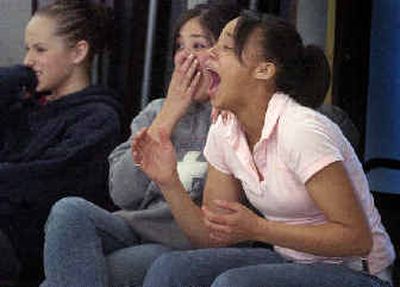His humor’s different, and it starts with himself

Drew Lacapa never thought of himself as funny.
But when he got in front of a crowd back in college and people started laughing, he realized: “I’m a natural ham.”
The Native American comic follows the tradition of ethnic comedians who use humor to tackle the difficult issues facing their people and who poke fun at the quirky idiosyncrasies that make each culture unique.
Where Lacapa is different, though, is how he does it. Instead of making fun of others, as some comedians are known to do, he finds humor in his own flaws.
“If I’m able to lay my shortcomings out on the table, it allows people to be more comfortable with their shortcomings,” Lacapa said in an interview before his performance at an Indian Youth Leadership Camp on Saturday. “It’s OK to make mistakes, that’s how we grow and become better human beings.”
Organizers of the annual leadership camp sought speakers who could connect with young people. Lacapa fit that description, they said, because kids respond well to humor – especially Native American kids.
“Indians have irreverent humor,” said Toni Lodge, executive director of the Native Project. “That’s what’s kept us alive for the past 500 years.”
Addressing an audience of about 100 Native American middle and high schoolers, Lacapa explored a wide range of topics, from health problems to tribal identity to religious rituals.
“My secret Indian name is Sweet and Low,” said Lacapa, who is a diabetic, earning laughs from the crowd.
While filming a video promoting health and fitness among Natives, Lacapa said, he was forced to depart from his four food groups of Spam, fry bread, sugar and coffee. He complained about having to eat vegetarian meals, and when someone said it was necessary in order for him to get in shape, Lacapa replied: “I am in shape – I’m round.”
Lacapa has lost half of his weight since that time, from nearly 400 pounds to 228 pounds. The stretch marks on his stomach, Lacapa joked, look like a Navajo rug.
His current exercise regime consists of chasing his eight grandchildren all over the place. Lacapa, 45, lives on the Fort Apache reservation in Arizona, and has blood of the Hopi, Tewa, Apache and Scottish-Irish in his veins.
“I credit them with my alcoholism,” Lacapa said, referring to his mother’s part-Scottish-Irish background. “If all else fails, I have gambling to fall back on.”
Lacapa’s act also incorporated various spiritual themes.
Indians consume so much salt, Lacapa said, they’ll be reincarnated as salt blocks in their next life.
In the area of comparative religion, Lacapa pointed out the difference between Christians going to church and Natives entering sweat lodges.
“They get dolled up,” Lacapa said. “We get undressed.”
Lacapa recalled how he tried to get his large body through the small hut door. He decided to back into it, feet first, while the Hokey Pokey song played in his head. “You put your right foot in …”
After managing to get inside, Lacapa recalled sitting with his fellow Native men, cheek-to-cheek (no, the other kind of cheek), as heated rocks – “directly from hell,” Lacapa said – were brought in.
The intense heat in the hut – intended to cause therapeutic sweating – gave Lacapa a head rush. And while a holy man began singing, Lacapa bawled.
“I wasn’t even singing, I was crying,” Lacapa said, “but it sounded the same way.”
Prayers were said for ancestors and babies, creepy crawlies and the two-leggeds walking in Wal-Mart, Lacapa said. “I wasn’t praying for the people,” he quipped. “I was praying for myself.”
As strange as this may sound to those who haven’t experienced such a ritual, some audience members could relate.
“My first time was kind of like that,” said Dillon Wetmore, 18, a senior at Ferris High School who attended the three-day camp. Wetmore has seen other comedy acts before, but this was his first Native comedian show. “It’s stuff you know,” Wetmore said. “It’s so funny because it’s actually true.”